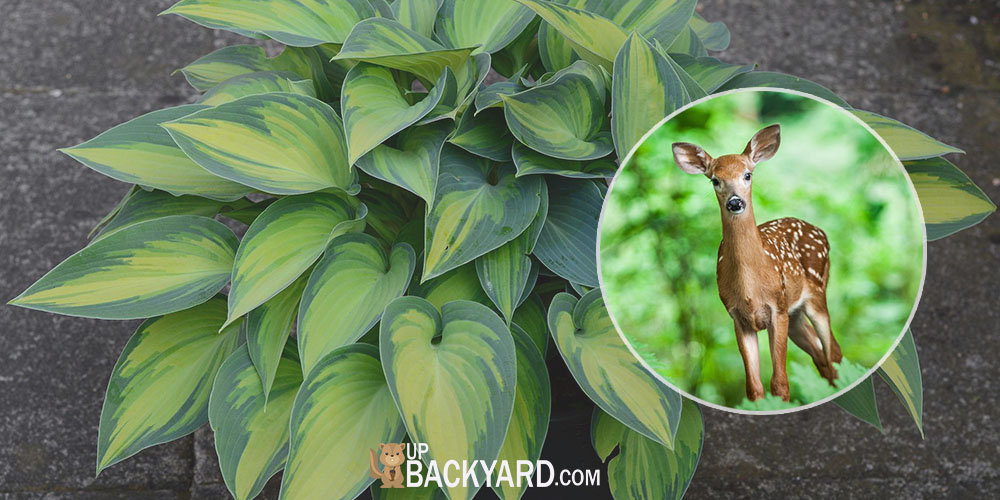Nothing adds to a garden quite like Hostas. These beautiful, low-lying plants are known for their unique foliage and tall flower stems.
Hostas come in a variety of colors in both their foliage and flowers. With flowers ranging from white, lavender, or deep purple and leaves that can grow in bi-colored greens, whites, or greenish blue hues, Hostas are a common and easy-to-grow garden and landscape plant.
With wild rabbits, deer, and other foragers commonly stalking your garden for food, it is only natural to have concern over your shade-loving Hostas.
So, will deer eat Hostas? Yes, deer love to make a meal of Hostas and can do a large amount of damage in a short time frame.
So what can you do when you notice deer munching on your hosta plants? Read on to explore more about protecting your Hostas from deer.
Will Hostas Grow Back After Deer Eat Them?
Hostas are extremely resilient and can thrive even in situations that are less than ideal. If you notice that your hostas have become lunch for a few deer, you may begin to panic.
Will they grow back?
Luckily, hostas that have been eaten by deer will most likely make a full comeback. Deer tend to only eat the leaves of the hosta plant, and mainly the upper leaves.
As long as a plant has some leaves remaining, they will be able to perform photosynthesis.
Photosynthesis is the process in which a plant uses energy from the sun and converts it into energy the plant can use in the form of sugar. This process takes place in the plant’s leaves.
If your hosta has had too many leaves eaten or does not have enough healthy leaves remaining, the plant may not be able to perform enough photosynthesis.
The hosta will require a great amount of energy to regrow new leaves to replace the leaves that were eaten. If the plant cannot create enough energy, it will turn yellow and slowly die off.
Hostas are perennial plants in many parts of the United States. This means that they will grow back year after year. They sprout anew in the spring and die off completely in the winter.
If a deer eats your hosta and it dies at the end of the season, there is a good chance the hosta will return the following spring.
What Hostas Will Deer Not Eat?
When it comes to making decisions on which Hostas to add to your garden space, you may be considering colors of foliage or flowers.
But, should you be making decisions based on how the plant is viewed by predators? Are there any Hostas that deer will not eat?
Sadly, there are not any types of Hostas that are deer repellent. Deer love to munch on the large, crisp leaves of hosta plants. This makes any type of hosta susceptible to damage from deer.
If you are hoping to prevent attracting deer to your garden space, plant hostas that do not produce fragrant flowers or ones that grow variegated leaves.
Fragrant and bright flowers will catch the animal’s attention quicker than flowers that look pretty but offer little scent.
Deer are also more attracted to variegated leaves. These leaves are usually bicolored with green and white or green and darker bluish green. Deer can spot these plants easier than hostas with only green leaves.
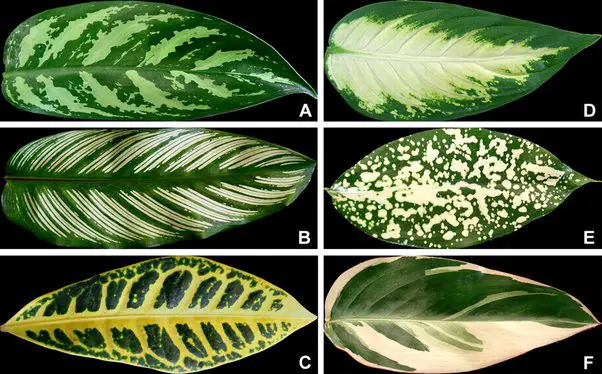
Even when you choose to go with less fragrant or monotoned leaves, there is still a good chance that a deer will find your hostas if you live in an area frequented by deer.
Sadly, there is no way to 100% prevent animals from munching on your hostas. However, there are steps you can take to deter and ward off deer.
Will Coffee Grounds Keep Deer From Eating Hostas?
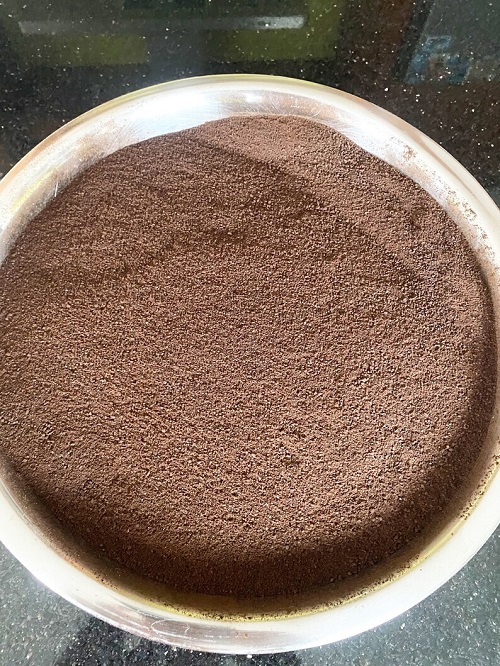
When looking for a solution to your deer problem, you most likely want to choose a natural repellent that won’t harm your plants or the environment.
What about using spent coffee grounds? Will coffee grounds keep deer from eating my hostas?
In search for answers, I headed over to PestPointers and found that while there have been no scientific studies done, it did seem that coffee grounds did deter deer from gardens.
Even though we do not know for sure if deer just simply do not like the smell of coffee or if deer associate the smell with humans, throwing used coffee grounds into your garden space seems like a pretty easy way to deter them!
To help increase the likelihood of the coffee grounds warding off deer, it is best to try to get the grounds to smell strong.
Brewing hot coffee releases more acid from the coffee grounds and creates a stronger smell. However, using grounds that were used to make cold brew could also be effective.
You can store your coffee grounds in a plastic bag for a few days before sprinkling them outside to increase the smell, as well.
Be careful not to leave the moist grounds in a sealed baggie for too long, as they can begin to mold. Mold can be bad for your plants and your garden’s ecosystem.
It is also important to note that you should sprinkle the coffee grounds near your plants to deter the deer, but not directly on them.
It is best to leave about a foot or two of space between the coffee grounds and your plants as the acid from the coffee grounds can upset the soil balance for your plants.
While some plants enjoy acidity in their soil and can thrive with weekly coffee grounds, it is best to play it safe and instead sprinkle the coffee grounds off to the side or around the perimeter of your garden space.
What is the Best Deer Repellent?
What happens if coffee grounds do not do the trick and you still have deer eating your plants? What is the best deer repellent?
When you begin looking for ways to protect your plants from deer, you will see that there are different approaches to deterring the animals. One way of warding off deer is to scare them off.
Scaring deer off may sound exhausting if you think of chasing away deer every time you see one.
You may also wonder if a scarecrow would successfully scare off deer. While a scarecrow or other human-looking figure could be enough to make deer wary of your space, choosing a motion-activated light may be your best bet.
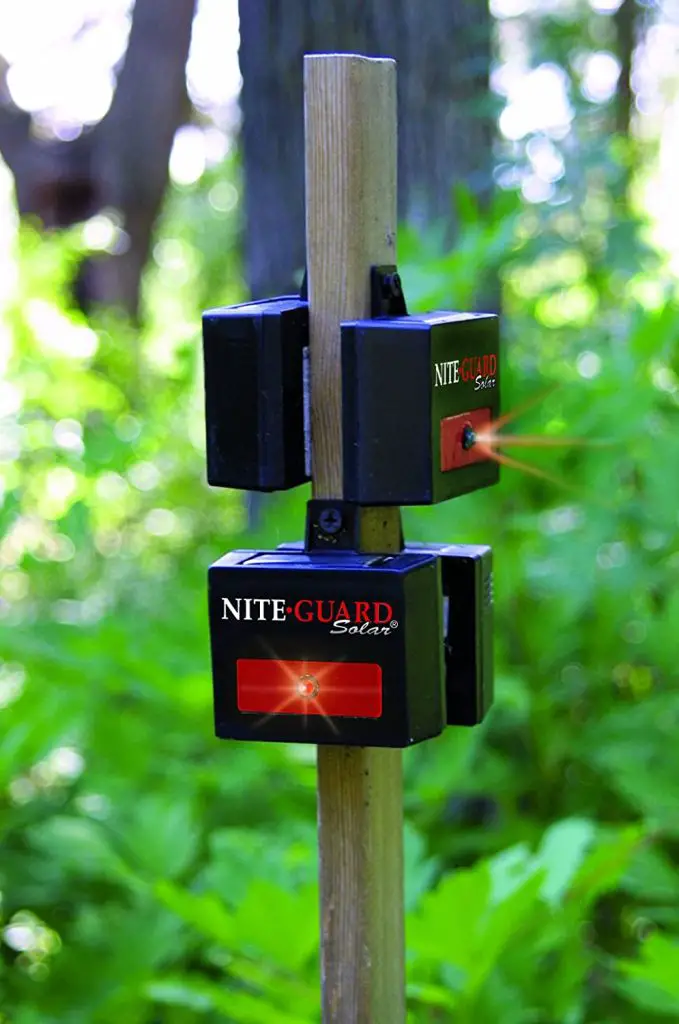
While you may think that solar powered motion activated lights are more for deterring burglars or vandals, these lights also scare off deer.
When a deer activates the light, it will begin shining bright, startling the deer and causing them to run off. This is a great option for anyone who does not want to use deer spray.
If you do not think that the lights will be enough, or if you want to add extra protection to your garden, choosing a spray may be the way to go.
There are two main types of deer spray. One makes the deer believe there is a predator nearby and the other type of deer spray deters the deer from eating the plants.
Liquid Fence Option
Choosing which type of spray depends entirely on what you are trying to achieve. If you are growing food in your garden for human consumption, it is probably best to choose the Liquid Fence option.
This spray is used along the perimeter of your garden and tricks deer into thinking a predator is there.
Since this spray does not come in contact with the plants, it is safe to use to protect a vegetable or herb garden from deer, rabbits, or other foragers.
Like all other deer repellent techniques, Liquid Fence also has a few negative points. You may have to reapply this spray frequently and it is known to have a bad smell when it is first sprayed.
Deer Out Option
If you do not plan on consuming the plants that you are trying to protect from deer, choosing a deer repellent that can be sprayed directly onto the plants is a great and effective option.
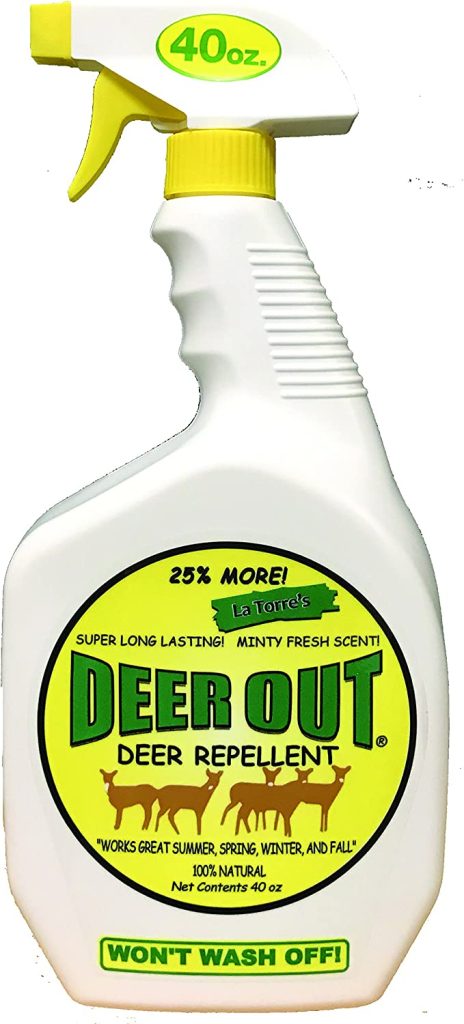
Deer Out uses scents like peppermint to deter deers from eating plants.
When using Deer Out, you spray the solution directly on whichever plants you are trying to protect from deers.
This differs greatly from the Liquid Fence spray. Instead of creating a perimeter of protection, you are simply making the plants unappetizing to deer to hopefully curb their appetite for your garden.
Final Thoughts
Hostas are incredibly attractive to both humans and deer. While we choose to add hostas to our garden spaces because of their beauty and hardiness, deer love to munch on their large, crisp leaves and fragrant flowers.
Luckily, most hostas that have been eaten by deer can and do make a full recovery. However, there are some instances when hostas cannot be restored after a deer takes off too many leaves or damages the plant beyond repair.
You can use many methods to ward off deer and protect your hostas this season.
(1) Using coffee grounds in your garden space can ward off deer. It is unknown if deer dislike the smell of coffee itself or associate the smell with humans. Either way, deer tend to avoid areas that smell like coffee.
(2) Motion-activated lights can scare deer away as they enter your garden looking for a late-night snack.
These lights tend to be solar-powered and require very little maintenance or human interaction once installed. This could be the perfect option for those who do not want to bother with sprays.
(3) Deer Spray offers another level of protection. A liquid Fence is used as a perimeter and uses scent to deter deers from the area. This spray makes deer think there is a predator in the area.
Deer Out can be sprayed directly on the plants you are trying to protect. This spray makes plants undesirable to deer, hopefully deterring them from attempting to eat them.
No matter which approach you use, there is no way to 100% prevent deer from making a meal of your hostas or garden space.
Staying diligent in your prevention methods is the best way to keep your garden protected from predators.
